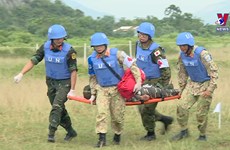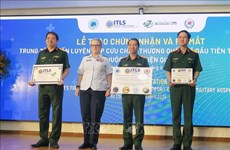Vietnam vigilant over A/H7N9 avian influenza
Vietnam has so far recorded no A/H7N9 and A/H9N2 avian flu cases, but needs to be vigilant over the disease, which is developing complicatedly in neighbouring China.
 Illustrative image (Source: VNA)
Illustrative image (Source: VNA)The Department said on December 18 that the World Health Organisation (WHO) and the National Health and Family Planning Commission of China reported two additional cases of A/H7N9 virus and four of A/H9N2 virus.
Therefore, there is a high risk of virus transmission as the two countries share a long border line and have busy trade activities, especially the increasing demand of poultry during New Year and lunar New Year (Tet) holidays.
The Ministry of Health is closely working with the Ministry of Agriculture and Rural Development to increase the inspection of diseases in human and poultry for early detection and prevention.
To proactively prevent disease, the Ministry of Health has recommended that people should wash their hands with soap, ensure good personal hygiene, and limit their contact with patients. They were also advised to not use poultry or poultry products with unknown origins, and ensure food safety.
People were told to immediately notify the local authorities and veterinary units if they detected any sick or dead poultry.
In particular, people who return from areas where there is an epidemic must apply preventive measures, and report their health status to local health authorities to be monitored. People should visit doctors to be counselled, examined and receive treatment if they have flu-like symptoms such as fever, cough, chest pain or difficult breathing.
WHO has recommended that tourists who travel to countries with such an epidemic should not be near areas where there are slaughter houses, and should stay away from poultry or avoid contact with live poultry and poultry sold in markets.
They should also not touch material contaminated by faeces of poultry or livestock. People with symptoms of acute respiratory infections while travelling or just returning from areas with an epidemic should visit a doctor for an examination and to determine the disease.
According to WHO, A/H9N2 avian influenza was first detected in 1999. There is no evidence of human-to-human infections.
Meanwhile, the UN Food and Agricultural Organisation (FAO) announced that the A/H7N9 virus has been continually detected in animals in multiple provinces in China since June.
So far, 683 human infections with A/H7N9 have been reported globally.-VNA













